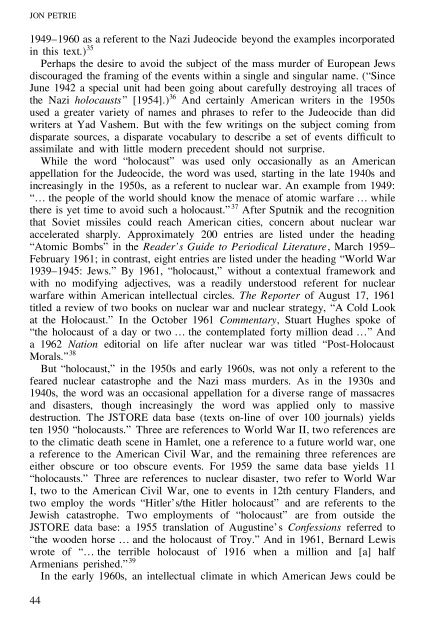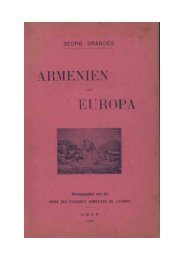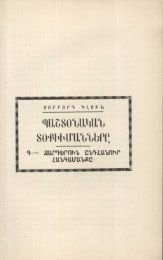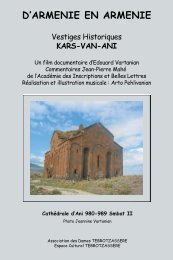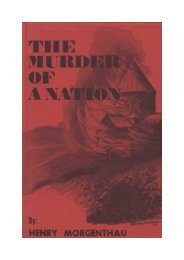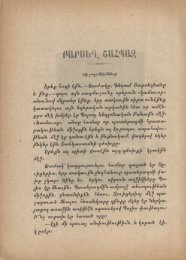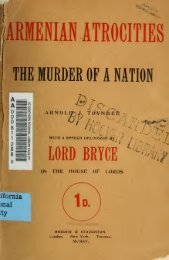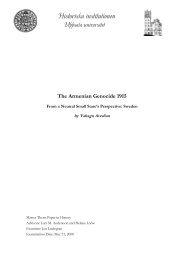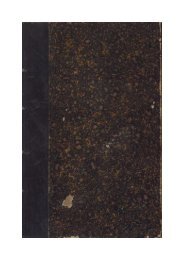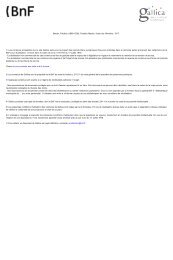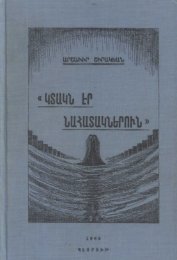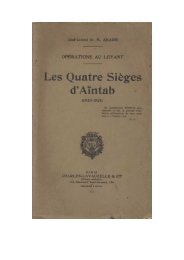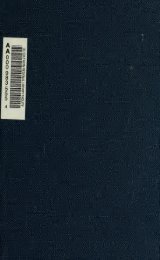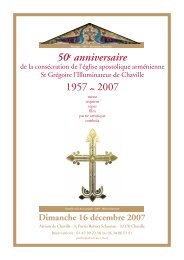The secular word HOLOCAUST: scholarly myths, history, and 20th ...
The secular word HOLOCAUST: scholarly myths, history, and 20th ...
The secular word HOLOCAUST: scholarly myths, history, and 20th ...
Create successful ePaper yourself
Turn your PDF publications into a flip-book with our unique Google optimized e-Paper software.
JON PETRIE1949–1960 as a referent to the Nazi Judeocide beyond the examples incorporatedin this text.) 35Perhaps the desire to avoid the subject of the mass murder of European Jewsdiscouraged the framing of the events within a single <strong>and</strong> singular name. (“SinceJune 1942 a special unit had been going about carefully destroying all traces ofthe Nazi holocausts” [1954].) 36 And certainly American writers in the 1950sused a greater variety of names <strong>and</strong> phrases to refer to the Judeocide than didwriters at Yad Vashem. But with the few writings on the subject coming fromdisparate sources, a disparate vocabulary to describe a set of events dif cult toassimilate <strong>and</strong> with little modern precedent should not surprise.While the <strong>word</strong> “holocaust” was used only occasionally as an Americanappellation for the Judeocide, the <strong>word</strong> was used, starting in the late 1940s <strong>and</strong>increasingly in the 1950s, as a referent to nuclear war. An example from 1949:“… the people of the world should know the menace of atomic warfare … whilethere is yet time to avoid such a holocaust.” 37 After Sputnik <strong>and</strong> the recognitionthat Soviet missiles could reach American cities, concern about nuclear waraccelerated sharply. Approximately 200 entries are listed under the heading“Atomic Bombs” in the Reader’s Guide to Periodical Literature, March 1959–February 1961; in contrast, eight entries are listed under the heading “World War1939–1945: Jews.” By 1961, “holocaust,” without a contextual framework <strong>and</strong>with no modifying adjectives, was a readily understood referent for nuclearwarfare within American intellectual circles. <strong>The</strong> Reporter of August 17, 1961titled a review of two books on nuclear war <strong>and</strong> nuclear strategy, “A Cold Lookat the Holocaust.” In the October 1961 Commentary, Stuart Hughes spoke of“the holocaust of a day or two … the contemplated forty million dead …” Anda 1962 Nation editorial on life after nuclear war was titled “Post-HolocaustMorals.” 38But “holocaust,” in the 1950s <strong>and</strong> early 1960s, was not only a referent to thefeared nuclear catastrophe <strong>and</strong> the Nazi mass murders. As in the 1930s <strong>and</strong>1940s, the <strong>word</strong> was an occasional appellation for a diverse range of massacres<strong>and</strong> disasters, though increasingly the <strong>word</strong> was applied only to massivedestruction. <strong>The</strong> JSTORE data base (texts on-line of over 100 journals) yieldsten 1950 “holocausts.” Three are references to World War II, two references areto the climatic death scene in Hamlet, one a reference to a future world war, onea reference to the American Civil War, <strong>and</strong> the remaining three references areeither obscure or too obscure events. For 1959 the same data base yields 11“holocausts.” Three are references to nuclear disaster, two refer to World WarI, two to the American Civil War, one to events in 12th century Fl<strong>and</strong>ers, <strong>and</strong>two employ the <strong>word</strong>s “Hitler’s/the Hitler holocaust” <strong>and</strong> are referents to theJewish catastrophe. Two employments of “holocaust” are from outside theJSTORE data base: a 1955 translation of Augustine’s Confessions referred to“the wooden horse … <strong>and</strong> the holocaust of Troy.” And in 1961, Bernard Lewiswrote of “… the terrible holocaust of 1916 when a million <strong>and</strong> [a] halfArmenians perished.” 39In the early 1960s, an intellectual climate in which American Jews could be44


